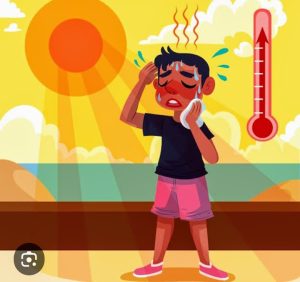

By Dada Ahmed.

(C) Freepik.
The sun rises in Lokoja, Kogi State capital,these days not with grace, but many residents say with seeming vengeance but confess their ignorance of what they must have done to attract such nature’s anger.
Geographically,Lokoja is located in north-central Nigeria at the confluence of the Niger and Benue rivers, surrounded by hills and lying at a low elevation. This geographical position, combined with limited vegetation cover and its inland location, contributes to excessive heat compared to other towns in Nigeria, especially coastal or highland areas with cooler climates.
According to weather records, as of 8:07 a.m. on Tuesday, April 8, 2025, Lokoja, Nigeria, experienced mostly sunny conditions with a temperature of 78°F (26°C). Historically, the month of April in Lokoja records average high temperatures of around 94°F (34°C) and lows of about 76°F (24°C), which underscores the current excruciating heat being experienced in the area.
Experience shows that even when electricity is available to power fans and air conditioners, the searing heatwave often exceeds their capacity to provide relief. As a result, many residents are forced to sleep outdoors at night,braving security risks just to escape the stifling indoor heat.
According to health professionals, heat wave represents a period of excessively hot weather, which may be accompanied by high humidity.
They identify its causes include high atmospheric pressure,climate change,urbanization,dry soil and drought.and changes in jet stream patterns among others.
From the early hours of the morning until dusk, the city simmers under an oppressive blanket of heat, suffocating its people and choking its rhythm of life. The once lively streets of Lokoja, the capital of Kogi State, now wear a drained look by midday. Traders abandon their stalls. Children remain indoors. Offices, even when powered by intermittent electricity, become furnaces of discomfort. And for many, sleep comes only in fragments—if at all.
This is not just another hot season. This is a heatwave—silent, deadly, and disruptive.
Lokoja, nestled at the confluence of the Niger and Benue rivers, has always experienced warm temperatures. But in recent weeks, the heat has turned unbearable, with midday temperatures soaring above 40°C (104°F). Even the wind, usually a bearer of comfort, now blows with the warmth of an oven.
The impact on the socio-economic life of the city is stark. Outdoor businesses, especially roadside vendors, farmers, and construction workers, have been the worst hit. Many now work fewer hours due to the risk of heat exhaustion. Commercial motorcyclists,the lifeline of local transportation,are reporting fatigue, headaches, and dizziness, leading to a rise in minor accidents.
Feelers from some hospitals in Lokoja show that the is beginning to see an uptick in cases related to heat stress. Medical reports from some of these health institutions confirm an increase in patients experiencing dehydration, heat rash, and heat-induced fatigue. “We are also seeing a concerning number of hypertensive patients with complications linked to the heat,”a medical doctor who works with the Federal Teaching Hospital,Lokoja acknowledged this harsh weather condition under the condition of anonymity.
Health experts warn that prolonged exposure to extreme heat is not just uncomfortable, but a dangerous development.
The World Health Organization (WHO) lists heat waves as one of the deadliest weather-related phenomena.
Some common heat-related illnesses include heat stroke, life-threatening conditions caused by the body overheating, potentially leading to organ failure. and heat exhaustion,characterised by heavy sweating, rapid pulse, and nausea.
Dehydration,especially dangerous for children and the elderly, leading to kidney issues and circulatory problems coupled with worsening of chronic illnesses leading to high temperatures which can escalate conditions like asthma, heart disease, and high blood pressure.
The medical experts add that the heatwave situation is further worsened by environmental degradation. They observe that deforestation, poor urban planning, and increasing concretization in Lokoja have stripped the city of the natural cooling effects trees and green spaces once provided.
They call on the Kogi State Government to as a matter of necessity,embark on aggressive sensitization about the dangers of heat waves and how to stay safe.
The experts also stress the need for health facilities to be equipped with adequate facilities and manpower to handle heat-related emergencies with trained personnel and hydration points.
According to them,reviving urban forests, planting shade trees, and creating green belts can mitigate xtreme temperatures in addition to improved water supply ,reliable and affordable access to clean water, especially in rural and peri-urban areas.
At individuals level, the experts also called on residents to stay hydrated by drinking water regularly,and not waiting til they are thirsty , adding that the people should wear light clothing such as ght-colored, loose-fitting clothes to reduce heat absorption.
Residents have also been advised to avoid outdoor activities, especially at peak hours , stressing the sun is strongest between 11 a.m. and 4 p.m.and should use ventilation aids such as fans, open windows, adding that, where available, air conditioners, can help maintain a tolerable indoor climate.
They medical experts emphasized the imperative of checking on vulnerable neighbors, most especially the elderly, infants, and those with chronic illnesses at higher risk and need support.
In all,it must be noted that what Lokoja is facing today is a warning. It shows that climate change is no longer a distant threat,but a present reality indicating that if proactive measures are not taken, the human, social, and economic costs will only rise.
As the sun blazes on, Lokoja and its environs must not be left to suffer in silence. Government agencies, community leaders, health professionals, and individuals all have a role to play in cooling Lokoja—before it’s too late.
Ahmed is the publisher of The Reporters.
ahmeddada008@gmail.com.


